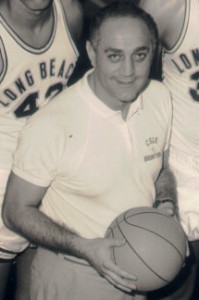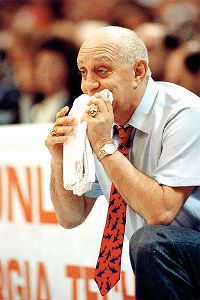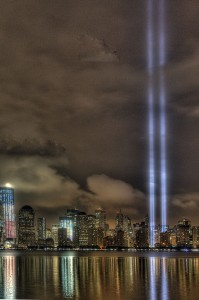 As a young college coach, I had the great fortune to meet and become extremely close to one of the most
As a young college coach, I had the great fortune to meet and become extremely close to one of the most  powerful figures in basketball, sneaker kingpin Sonny Vaccaro.
powerful figures in basketball, sneaker kingpin Sonny Vaccaro.
Like many coaches, Sonny gave me my first adidas sneaker contract. But it was a story Sonny once shared with me as a young high school coach working his Nike All-American camp that has stayed with me for over 25 years. The story still resonates with me today as I reflect on my unlikely friendship and connection to another legend – Jerry Tarkanian, who died last week.
As we sat in his hotel suite at what would be my first NCAA Final Four, Sonny was sharing some of his Italian godfather-like wisdom. He said when he was a young man, he once asked his father – who would play cards with the same group of characters every day – why he always played with a player whom he knew cheated.
Sonny’s father said, “Because he cheats and we all know. It is the reason we play cards with him every day.”
In other words, whatever someone’s character may be, if they are up front about it, you know what you are dealing with and can make your decisions accordingly. It’s the people who are not up front that you need to worry about.
It was a powerful story, a life lesson I have never forgotten and the reason I personally loved Coach Tark. As he once said to me, “Bobby you will go on to learn that this is a very cut-throat business with a lot of hypocrites. And if the mainstream media and fans who follow the game ever knew the real truth on all the cheating and politics going on behind the scenes, the bottom would fall out of the game.”
It is another memorable statement I would never forget and can attest to being true after spending 18 years coaching college basketball at the highest level .
The first time I met Coach Tark, he came into Tolentine High School in the Bronx to recruit one of our players, a 6-9 unbelievably talented young man named Anthony Cade, who would go on to finish his high school career at the famous Oak Hill Academy and become a McDonald’s All-American. I was able to go out to UNLV to work Coach Tark’s camp for several years and attend a few of his legendary four-hour practices.
At the time, I had never seen anything more intense; the full-court pressure defense, the up-tempo offense that saw one of his teams average 110 points per game before the shot clock, getting his teams in the best condition of any in the country . This would become the blueprint for my coaching and my teams throughout my career.
Unfortunately after the official visit, Anthony Cade also got to see one of Coach Tark’s practices. I was the poor soul who had to get on the phone to tell Tark that Cade had been scared off and didn’t want to work that hard. He ended up choosing Denny Crum and Louisville. Tark and myself ended up having a good laugh.
I look back now on the guys who would go on to make the NBA and the guys who did not, and his usually had nothing to do with their talent. Coach Tark knew this, so he would push kids and be very demanding. But his players always loved him and were loyal to him to the end because they knew no one cared more about them or their well-being.
 That loyalty was evident in 1991, when Larry Johnson, Stacey Augmon and Greg Anthony all were drafted in the first round. As rookies, each wore No. 2 for their respective teams as a tribute to Coach Tark.
That loyalty was evident in 1991, when Larry Johnson, Stacey Augmon and Greg Anthony all were drafted in the first round. As rookies, each wore No. 2 for their respective teams as a tribute to Coach Tark.
Yes, Tark gave many guys second and third chances, took on many reclamation projects and took chances on many tough-minded inner city kids with questionable backgrounds. Like a modern day Father Flanagan, he reached and saved and helped many more guys who made it and would change their life for the better, more than the NCAA or the media would care to admit.
Fast forward to the 2003 Final Four, where I was on a jam-packed elevator. A couple of weeks earlier, my Manhattan Jaspers were eliminated in the first round by Syracuse and Carmelo Anthony, who went on to win it all. A droopy-eyed, unmistakable looking man in the back of the elevator said, “Coach Bobby G, it’s Tark. Can you get off on this floor with me? I would like to talk with you.”
As we got off together, I remember thinking, I can’t believe Coach Tark, one of my coaching idols, knows and remembers me. But it would get better. Coach Tark would go on to say how he was following my career and my teams and no one in the country reminded him more of his UNLV squads who played like their lives depended on it more than my Manhattan teams. To this day it remains perhaps my most proud moment as a college coach.
I went on to develop a great close relationship with Coach Tark for many years. I would do clinics with him, talk on the phone for advice and use him as a coaching advocate throughout the years. For him to tell me my teams played like his fearless, cut-throat, unapologetic squads was unforgettable for me.
Coach Tark remembered who I was but often forgot my phone number, Every time he came to New York, he would call Howie  Garfinkel from Five-Star Basketball Camps and ask for my number for the hundredth time. I would meet up with him and we would have a blast.
Garfinkel from Five-Star Basketball Camps and ask for my number for the hundredth time. I would meet up with him and we would have a blast.
A very memorable meeting came after the tragic terrorist attacks of Sept. 11, 2001. He wanted to go Ground Zero, which was shut off to the public. But I picked up Coach Tark and we drove to Wall Street. We both just stood there speechless with tears in our eyes. It was surreal, with smoke still rising and embers still burning.
As we somberly made our way back to the car , a policeman walked up and said, “How did you guys get past the barricade? No one is allowed down here right now.”
Before we could give an answer, the cop said, “Wait, I recognize you. Aren’t you the Manhattan coach, Bobby Gonzalez?”
I told him I was, and Tark and I broke out in laughter. “You recognize me but don’t you know who this is?” I asked.
All of the sudden, the cop said, “Oh, yeah, you’re that Armenian guy who chews on the towel.”
As we drove to Mulberry Street in Little Italy to eat at Il Cortile, one of Coach Tark’s favorite places, he turned to me and said, “Only in New York.” Later that day, Coach Tark took time to speak to my team and take pictures and sign autographs on our campus.
Legendary former coach Rollie Massimino – another colorful character – once said to me, “If you have the reputation of getting up early in the morning, then you can sleep until noon every day and get away with it.” That is a very true statement, especially when it comes to the world today, where perception is bigger than reality. Because of the current climate of political correctness, there are not a lot of fun characters left coaching the game today. Like dinosaurs, they have become extinct. Sadly, Tark is no exception.
The last time we ever spoke, he reminded me that he once counseled me not to take the Seton Hall job because he didn’t think I could win big enough there to survive. He ironically mentioned how the days of the Al Maguires, Jim Valvanos, Lou Carneseccas and coaches like himself who were considered colorful characters were over.
As Coach Tark became a bit less coherent with health issues, I was very happy he was finally honored by the basketball establishment and inducted into the Hall of Fame, It could not be more deserved. The age of the 24-hour news cycle and social media has publicly vilified any coach that would be considered a character or not buttoned up enough, and no coach was more of a character than Tark the Shark.
Coach Tark, you were right. There are many cookie cutter coaches in the game now, and many of the people making the decisions want conservative and safe. You were truly one of the last great characters the game has known. I will miss you, Coach Tark. I was proud to call you my friend.
Bobby Gonzalez, a former Division I head coach at Manhattan and Seton Hall, is a regular contributing columnist for SheridanHoops.
MORE FROM GONZO:
MY MEMORIES OF COACH K, THE GREATEST COLLEGE COACH EVER
ANALYSIS OF THE RAJON RONDO TRADE
KNICKS, LAKERS, SHOULD BE LOOKING AT TOP 10 LOTTERY PICKS
BEST UNDER THE RADAR NCAA PROSPECTS